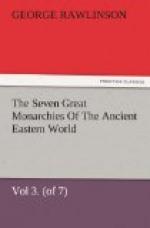The character of the Scythians, and the general nature of their ravages, have been described in a former portion of this work. If they entered Southern Asia, as seems probable, by the Daghestan route, they would then have been able to pass on without much difficulty, through Georgia into Azerbijan, and from Azerbijan into Media Magna, where the Medes had now established their southern capital. Four roads lead from Azerbijan to Hamadan or the Greater Ecbatana, one through Menjil and Kasvin, and across the Caraghan Hills; a second through Miana, Zenjan, and the province of Khamseh; a third by the valley of the Jaghetu, through Chukli and Tikan-Teppeh; and a fourth through Sefer-Khaneh and Sennah. We cannot say which of the four the invaders selected; but, as they were passing southwards, they met the army of Cyaxares, which had quitted Nineveh on the first news of their invasion, and had marched in hot haste to meet and engage them. The two enemies were not ill-matched. Both were hardy and warlike, both active and full of energy; with both the cavalry was the chief arm, and the bow the weapon on which they depended mainly for victory. The Medes were no doubt the better disciplined; they had a greater variety of weapons and of soldiers; and individually they were probably more powerful men than the Scythians; but these last had the advantage of numbers, of reckless daring, and of tactics that it was difficult to encounter. Moreover, the necessity of their situation in the midst of an enemy’s country made it imperative on them to succeed, while their adversaries might be defeated without any very grievous consequences. The Scytho had not come into Asia to conquer so much as to ravage; defeat at their hands involved damage rather than destruction; and the Medes must have felt that, if they lost the battle, they might still hope to maintain a stout defence behind the strong walls of some of their towns. The result was such as might have been expected under these circumstances. Madyes, the Scythian leader, obtained the victory, Cyaxares was defeated, and compelled to make terms with the invader. Retaining his royal name, and the actual government of his country, he admitted the suzerainty of the Scyths, and agreed to pay them an annual tribute. Whether Media suffered very seriously from their ravages, we cannot say. Neither its wealth nor its fertility was such as to tempt marauders to remain in it very long. The main complaint made against the Scythian conquerors is that, not content with the fixed tribute which they had agreed to receive, and which was paid them regularly, they levied contributions at their pleasure on the various states under their sway, which were oppressed by repeated exactions. The injuries suffered from their marauding habits form only a subordinate charge against them, as though it had not been practically felt to be so great a grievance. We can well imagine that the bulk of the invaders would prefer the warmer and richer lands of Assyria, Mesopotamia, and Syria; and that, pouring into them, they would leave the colder and less wealthy Media comparatively free from ravage.




